Topic No. 9 German

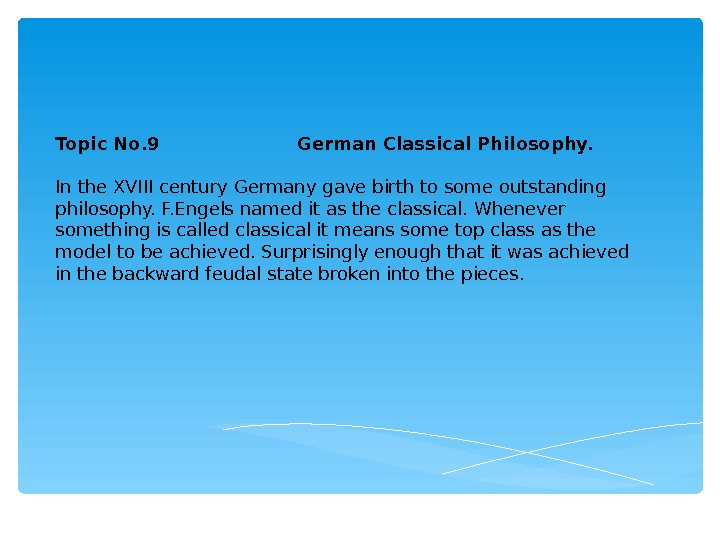
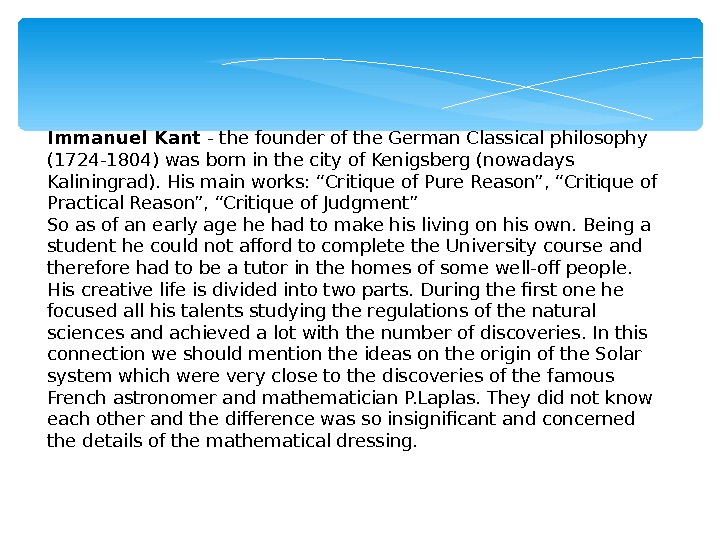
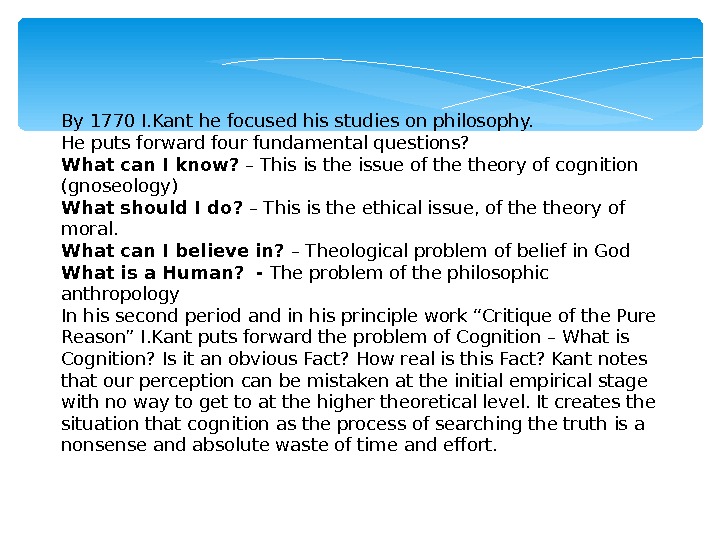
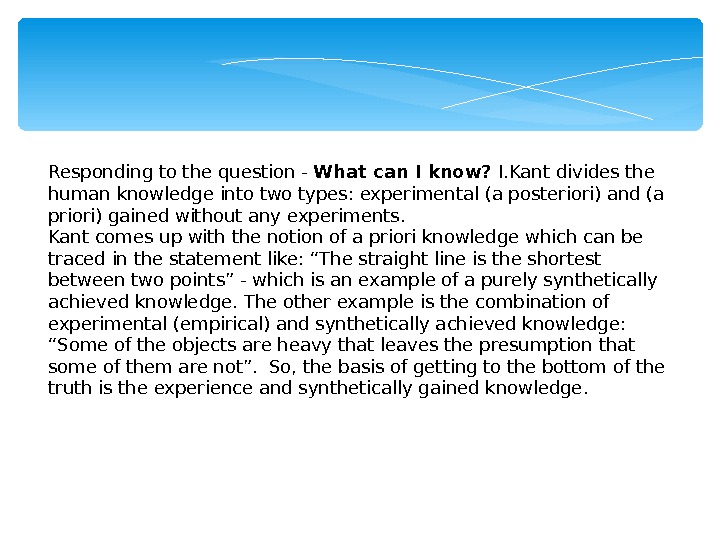
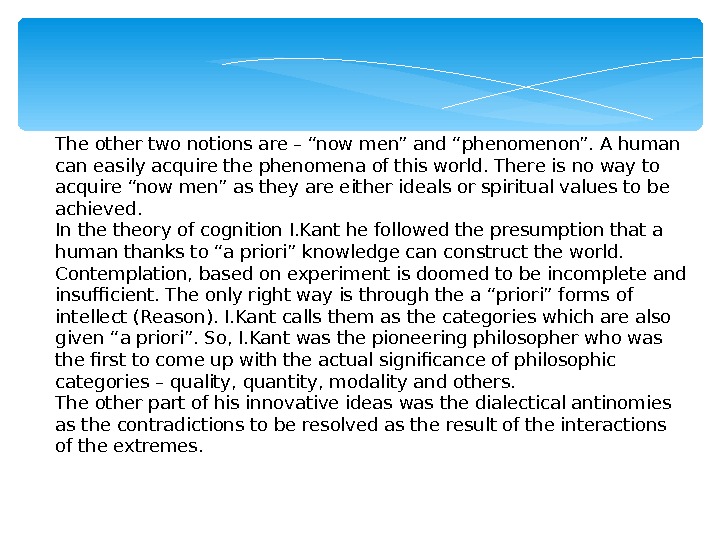
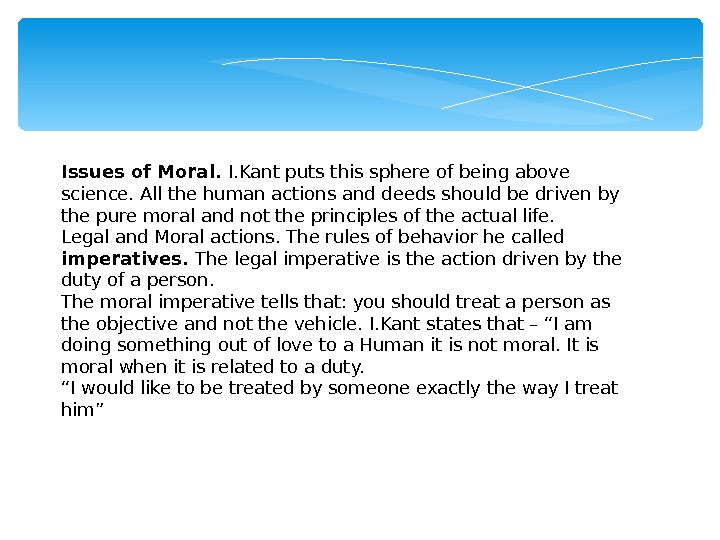
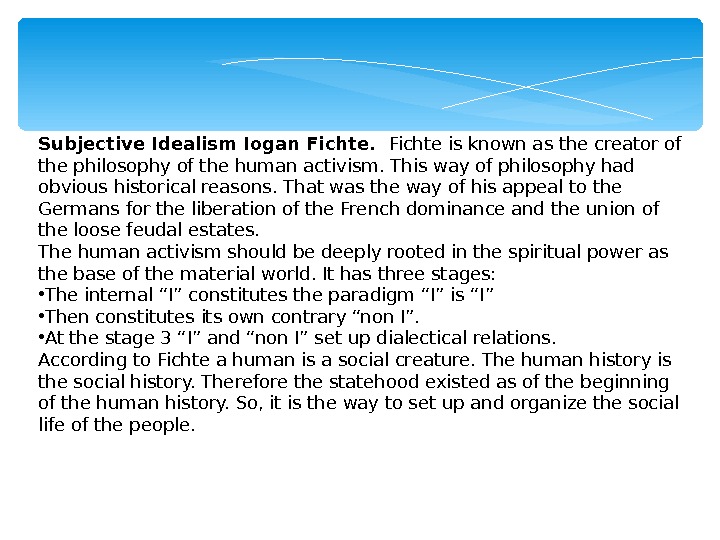
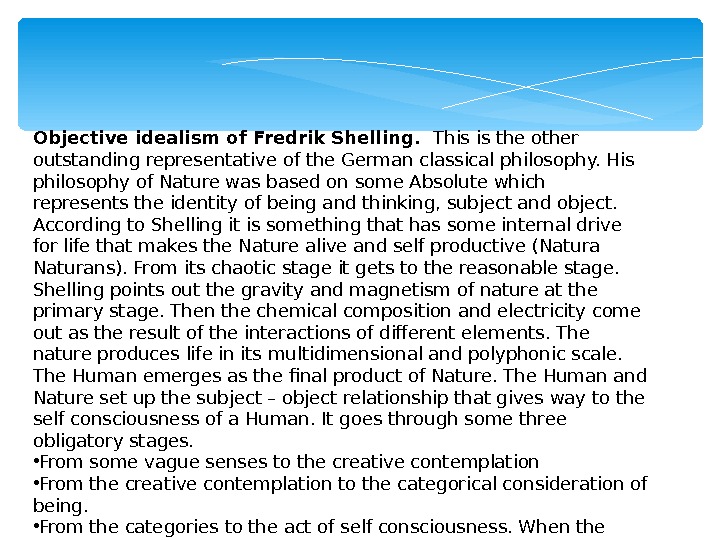
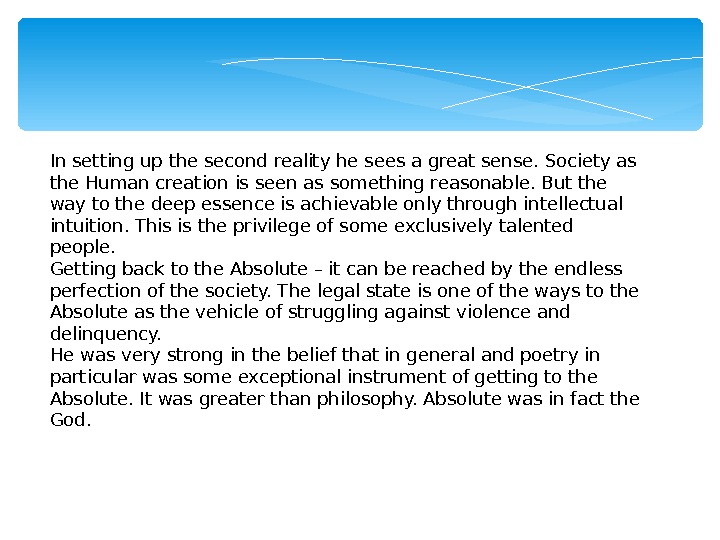
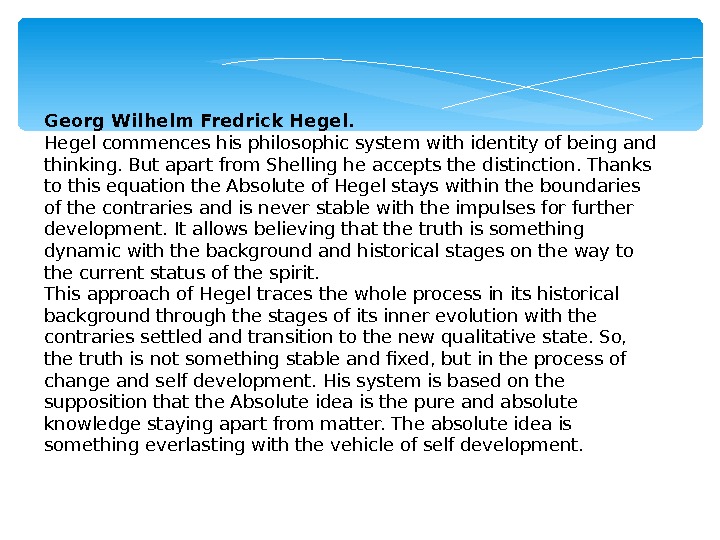
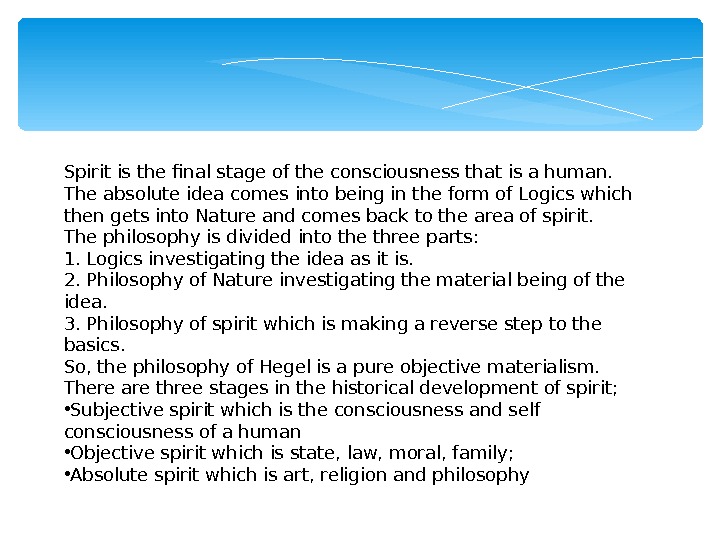
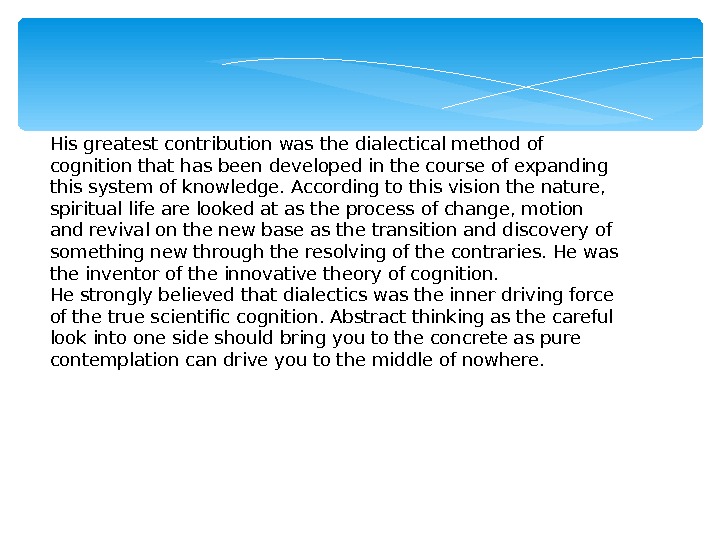

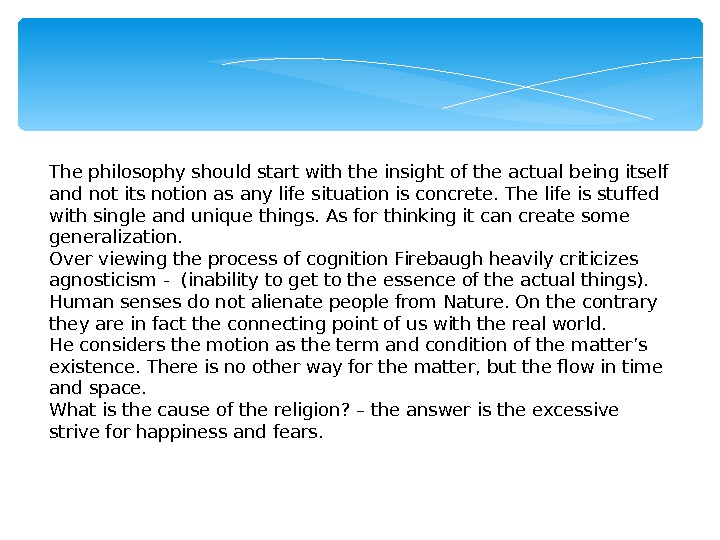
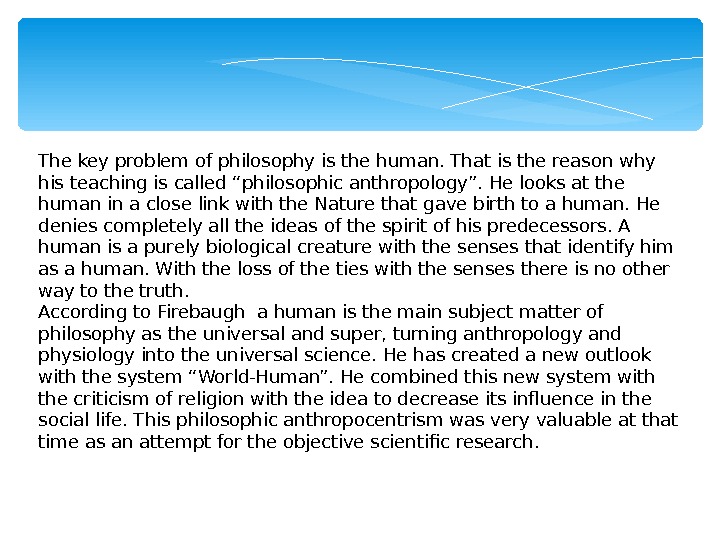
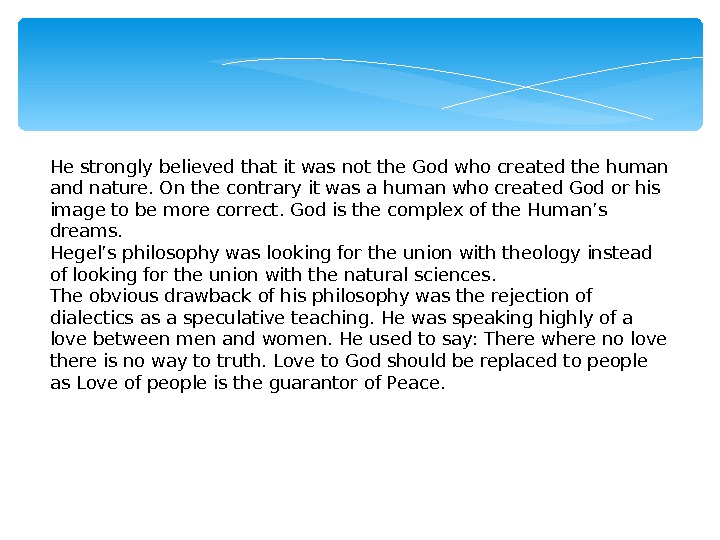
- Размер: 1008 Кб
- Количество слайдов: 16
Описание презентации Topic No. 9 German по слайдам
 Topic No. 9 German Classical Philosophy. In the XVIII century Germany gave birth to some outstanding philosophy. F. Engels named it as the classical. Whenever something is called classical it means some top class as the model to be achieved. Surprisingly enough that it was achieved in the backward feudal state broken into the pieces.
Topic No. 9 German Classical Philosophy. In the XVIII century Germany gave birth to some outstanding philosophy. F. Engels named it as the classical. Whenever something is called classical it means some top class as the model to be achieved. Surprisingly enough that it was achieved in the backward feudal state broken into the pieces.
 Immanuel Kant — the founder of the German Classical philosophy (1724 -1804) was born in the city of Kenigsberg (nowadays Kaliningrad). His main works: “Critique of Pure Reason”, “Critique of Practical Reason”, “Critique of Judgment” So as of an early age he had to make his living on his own. Being a student he could not afford to complete the University course and therefore had to be a tutor in the homes of some well-off people. His creative life is divided into two parts. During the first one he focused all his talents studying the regulations of the natural sciences and achieved a lot with the number of discoveries. In this connection we should mention the ideas on the origin of the Solar system which were very close to the discoveries of the famous French astronomer and mathematician P. Laplas. They did not know each other and the difference was so insignificant and concerned the details of the mathematical dressing.
Immanuel Kant — the founder of the German Classical philosophy (1724 -1804) was born in the city of Kenigsberg (nowadays Kaliningrad). His main works: “Critique of Pure Reason”, “Critique of Practical Reason”, “Critique of Judgment” So as of an early age he had to make his living on his own. Being a student he could not afford to complete the University course and therefore had to be a tutor in the homes of some well-off people. His creative life is divided into two parts. During the first one he focused all his talents studying the regulations of the natural sciences and achieved a lot with the number of discoveries. In this connection we should mention the ideas on the origin of the Solar system which were very close to the discoveries of the famous French astronomer and mathematician P. Laplas. They did not know each other and the difference was so insignificant and concerned the details of the mathematical dressing.
 By 1770 I. Kant he focused his studies on philosophy. He puts forward four fundamental questions? What can I know? – This is the issue of theory of cognition (gnoseology) What should I do? – This is the ethical issue, of theory of moral. What can I believe in? – Theological problem of belief in God What is a Human? — The problem of the philosophic anthropology In his second period and in his principle work “Critique of the Pure Reason” I. Kant puts forward the problem of Cognition – What is Cognition? Is it an obvious Fact? How real is this Fact? Kant notes that our perception can be mistaken at the initial empirical stage with no way to get to at the higher theoretical level. It creates the situation that cognition as the process of searching the truth is a nonsense and absolute waste of time and effort.
By 1770 I. Kant he focused his studies on philosophy. He puts forward four fundamental questions? What can I know? – This is the issue of theory of cognition (gnoseology) What should I do? – This is the ethical issue, of theory of moral. What can I believe in? – Theological problem of belief in God What is a Human? — The problem of the philosophic anthropology In his second period and in his principle work “Critique of the Pure Reason” I. Kant puts forward the problem of Cognition – What is Cognition? Is it an obvious Fact? How real is this Fact? Kant notes that our perception can be mistaken at the initial empirical stage with no way to get to at the higher theoretical level. It creates the situation that cognition as the process of searching the truth is a nonsense and absolute waste of time and effort.
 Responding to the question — What can I know? I. Kant divides the human knowledge into two types: experimental (a posteriori) and (a priori) gained without any experiments. Kant comes up with the notion of a priori knowledge which can be traced in the statement like: “The straight line is the shortest between two points” — which is an example of a purely synthetically achieved knowledge. The other example is the combination of experimental (empirical) and synthetically achieved knowledge: “Some of the objects are heavy that leaves the presumption that some of them are not”. So, the basis of getting to the bottom of the truth is the experience and synthetically gained knowledge.
Responding to the question — What can I know? I. Kant divides the human knowledge into two types: experimental (a posteriori) and (a priori) gained without any experiments. Kant comes up with the notion of a priori knowledge which can be traced in the statement like: “The straight line is the shortest between two points” — which is an example of a purely synthetically achieved knowledge. The other example is the combination of experimental (empirical) and synthetically achieved knowledge: “Some of the objects are heavy that leaves the presumption that some of them are not”. So, the basis of getting to the bottom of the truth is the experience and synthetically gained knowledge.
 The other two notions are – “now men” and “phenomenon”. A human can easily acquire the phenomena of this world. There is no way to acquire “now men” as they are either ideals or spiritual values to be achieved. In theory of cognition I. Kant he followed the presumption that a human thanks to “a priori” knowledge can construct the world. Contemplation, based on experiment is doomed to be incomplete and insufficient. The only right way is through the a “priori” forms of intellect (Reason). I. Kant calls them as the categories which are also given “a priori”. So, I. Kant was the pioneering philosopher who was the first to come up with the actual significance of philosophic categories – quality, quantity, modality and others. The other part of his innovative ideas was the dialectical antinomies as the contradictions to be resolved as the result of the interactions of the extremes.
The other two notions are – “now men” and “phenomenon”. A human can easily acquire the phenomena of this world. There is no way to acquire “now men” as they are either ideals or spiritual values to be achieved. In theory of cognition I. Kant he followed the presumption that a human thanks to “a priori” knowledge can construct the world. Contemplation, based on experiment is doomed to be incomplete and insufficient. The only right way is through the a “priori” forms of intellect (Reason). I. Kant calls them as the categories which are also given “a priori”. So, I. Kant was the pioneering philosopher who was the first to come up with the actual significance of philosophic categories – quality, quantity, modality and others. The other part of his innovative ideas was the dialectical antinomies as the contradictions to be resolved as the result of the interactions of the extremes.
 Issues of Moral. I. Kant puts this sphere of being above science. All the human actions and deeds should be driven by the pure moral and not the principles of the actual life. Legal and Moral actions. The rules of behavior he called imperatives. The legal imperative is the action driven by the duty of a person. The moral imperative tells that: you should treat a person as the objective and not the vehicle. I. Kant states that – “I am doing something out of love to a Human it is not moral. It is moral when it is related to a duty. “ I would like to be treated by someone exactly the way I treat him”
Issues of Moral. I. Kant puts this sphere of being above science. All the human actions and deeds should be driven by the pure moral and not the principles of the actual life. Legal and Moral actions. The rules of behavior he called imperatives. The legal imperative is the action driven by the duty of a person. The moral imperative tells that: you should treat a person as the objective and not the vehicle. I. Kant states that – “I am doing something out of love to a Human it is not moral. It is moral when it is related to a duty. “ I would like to be treated by someone exactly the way I treat him”
 Subjective Idealism Iogan Fichte is known as the creator of the philosophy of the human activism. This way of philosophy had obvious historical reasons. That was the way of his appeal to the Germans for the liberation of the French dominance and the union of the loose feudal estates. The human activism should be deeply rooted in the spiritual power as the base of the material world. It has three stages: • The internal “I” constitutes the paradigm “I” is “I” • Then constitutes its own contrary “non I”. • At the stage 3 “I” and “non I” set up dialectical relations. According to Fichte a human is a social creature. The human history is the social history. Therefore the statehood existed as of the beginning of the human history. So, it is the way to set up and organize the social life of the people.
Subjective Idealism Iogan Fichte is known as the creator of the philosophy of the human activism. This way of philosophy had obvious historical reasons. That was the way of his appeal to the Germans for the liberation of the French dominance and the union of the loose feudal estates. The human activism should be deeply rooted in the spiritual power as the base of the material world. It has three stages: • The internal “I” constitutes the paradigm “I” is “I” • Then constitutes its own contrary “non I”. • At the stage 3 “I” and “non I” set up dialectical relations. According to Fichte a human is a social creature. The human history is the social history. Therefore the statehood existed as of the beginning of the human history. So, it is the way to set up and organize the social life of the people.
 Objective idealism of Fredrik Shelling. This is the other outstanding representative of the German classical philosophy. His philosophy of Nature was based on some Absolute which represents the identity of being and thinking, subject and object. According to Shelling it is something that has some internal drive for life that makes the Nature alive and self productive (Naturans). From its chaotic stage it gets to the reasonable stage. Shelling points out the gravity and magnetism of nature at the primary stage. Then the chemical composition and electricity come out as the result of the interactions of different elements. The nature produces life in its multidimensional and polyphonic scale. The Human emerges as the final product of Nature. The Human and Nature set up the subject – object relationship that gives way to the self consciousness of a Human. It goes through some three obligatory stages. • From some vague senses to the creative contemplation • From the creative contemplation to the categorical consideration of being. • From the categories to the act of self consciousness. When the subject is put in contrary to the Nature and the reverse when a Human is considered as the object.
Objective idealism of Fredrik Shelling. This is the other outstanding representative of the German classical philosophy. His philosophy of Nature was based on some Absolute which represents the identity of being and thinking, subject and object. According to Shelling it is something that has some internal drive for life that makes the Nature alive and self productive (Naturans). From its chaotic stage it gets to the reasonable stage. Shelling points out the gravity and magnetism of nature at the primary stage. Then the chemical composition and electricity come out as the result of the interactions of different elements. The nature produces life in its multidimensional and polyphonic scale. The Human emerges as the final product of Nature. The Human and Nature set up the subject – object relationship that gives way to the self consciousness of a Human. It goes through some three obligatory stages. • From some vague senses to the creative contemplation • From the creative contemplation to the categorical consideration of being. • From the categories to the act of self consciousness. When the subject is put in contrary to the Nature and the reverse when a Human is considered as the object.
 In setting up the second reality he sees a great sense. Society as the Human creation is seen as something reasonable. But the way to the deep essence is achievable only through intellectual intuition. This is the privilege of some exclusively talented people. Getting back to the Absolute – it can be reached by the endless perfection of the society. The legal state is one of the ways to the Absolute as the vehicle of struggling against violence and delinquency. He was very strong in the belief that in general and poetry in particular was some exceptional instrument of getting to the Absolute. It was greater than philosophy. Absolute was in fact the God.
In setting up the second reality he sees a great sense. Society as the Human creation is seen as something reasonable. But the way to the deep essence is achievable only through intellectual intuition. This is the privilege of some exclusively talented people. Getting back to the Absolute – it can be reached by the endless perfection of the society. The legal state is one of the ways to the Absolute as the vehicle of struggling against violence and delinquency. He was very strong in the belief that in general and poetry in particular was some exceptional instrument of getting to the Absolute. It was greater than philosophy. Absolute was in fact the God.
 Georg Wilhelm Fredrick Hegel commences his philosophic system with identity of being and thinking. But apart from Shelling he accepts the distinction. Thanks to this equation the Absolute of Hegel stays within the boundaries of the contraries and is never stable with the impulses for further development. It allows believing that the truth is something dynamic with the background and historical stages on the way to the current status of the spirit. This approach of Hegel traces the whole process in its historical background through the stages of its inner evolution with the contraries settled and transition to the new qualitative state. So, the truth is not something stable and fixed, but in the process of change and self development. His system is based on the supposition that the Absolute idea is the pure and absolute knowledge staying apart from matter. The absolute idea is something everlasting with the vehicle of self development.
Georg Wilhelm Fredrick Hegel commences his philosophic system with identity of being and thinking. But apart from Shelling he accepts the distinction. Thanks to this equation the Absolute of Hegel stays within the boundaries of the contraries and is never stable with the impulses for further development. It allows believing that the truth is something dynamic with the background and historical stages on the way to the current status of the spirit. This approach of Hegel traces the whole process in its historical background through the stages of its inner evolution with the contraries settled and transition to the new qualitative state. So, the truth is not something stable and fixed, but in the process of change and self development. His system is based on the supposition that the Absolute idea is the pure and absolute knowledge staying apart from matter. The absolute idea is something everlasting with the vehicle of self development.
 Spirit is the final stage of the consciousness that is a human. The absolute idea comes into being in the form of Logics which then gets into Nature and comes back to the area of spirit. The philosophy is divided into the three parts: 1. Logics investigating the idea as it is. 2. Philosophy of Nature investigating the material being of the idea. 3. Philosophy of spirit which is making a reverse step to the basics. So, the philosophy of Hegel is a pure objective materialism. There are three stages in the historical development of spirit; • Subjective spirit which is the consciousness and self consciousness of a human • Objective spirit which is state, law, moral, family; • Absolute spirit which is art, religion and philosophy
Spirit is the final stage of the consciousness that is a human. The absolute idea comes into being in the form of Logics which then gets into Nature and comes back to the area of spirit. The philosophy is divided into the three parts: 1. Logics investigating the idea as it is. 2. Philosophy of Nature investigating the material being of the idea. 3. Philosophy of spirit which is making a reverse step to the basics. So, the philosophy of Hegel is a pure objective materialism. There are three stages in the historical development of spirit; • Subjective spirit which is the consciousness and self consciousness of a human • Objective spirit which is state, law, moral, family; • Absolute spirit which is art, religion and philosophy
 His greatest contribution was the dialectical method of cognition that has been developed in the course of expanding this system of knowledge. According to this vision the nature, spiritual life are looked at as the process of change, motion and revival on the new base as the transition and discovery of something new through the resolving of the contraries. He was the inventor of the innovative theory of cognition. He strongly believed that dialectics was the inner driving force of the true scientific cognition. Abstract thinking as the careful look into one side should bring you to the concrete as pure contemplation can drive you to the middle of nowhere.
His greatest contribution was the dialectical method of cognition that has been developed in the course of expanding this system of knowledge. According to this vision the nature, spiritual life are looked at as the process of change, motion and revival on the new base as the transition and discovery of something new through the resolving of the contraries. He was the inventor of the innovative theory of cognition. He strongly believed that dialectics was the inner driving force of the true scientific cognition. Abstract thinking as the careful look into one side should bring you to the concrete as pure contemplation can drive you to the middle of nowhere.
 Ludwig Firebaugh (1804 -1872 ) put forward somewhat different looks at the basic principle issues of philosophy. He was the only materialist among the German philosophers of that time. Initially he was the student of Hegel and attended the complete course of his lectures. In the end he was not attracted by his philosophy and did not follow his track. He was of strong opinion that any kind of idealism was a sophisticated justification of God. According to his system of philosophy there is no thinking separated from the material world. Thinking can be put into effect only when it is injected by the matter and gets to the point of being a function of beings gifted with the capacity which are humans.
Ludwig Firebaugh (1804 -1872 ) put forward somewhat different looks at the basic principle issues of philosophy. He was the only materialist among the German philosophers of that time. Initially he was the student of Hegel and attended the complete course of his lectures. In the end he was not attracted by his philosophy and did not follow his track. He was of strong opinion that any kind of idealism was a sophisticated justification of God. According to his system of philosophy there is no thinking separated from the material world. Thinking can be put into effect only when it is injected by the matter and gets to the point of being a function of beings gifted with the capacity which are humans.
 The philosophy should start with the insight of the actual being itself and not its notion as any life situation is concrete. The life is stuffed with single and unique things. As for thinking it can create some generalization. Over viewing the process of cognition Firebaugh heavily criticizes agnosticism — (inability to get to the essence of the actual things). Human senses do not alienate people from Nature. On the contrary they are in fact the connecting point of us with the real world. He considers the motion as the term and condition of the matter’s existence. There is no other way for the matter, but the flow in time and space. What is the cause of the religion? – the answer is the excessive strive for happiness and fears.
The philosophy should start with the insight of the actual being itself and not its notion as any life situation is concrete. The life is stuffed with single and unique things. As for thinking it can create some generalization. Over viewing the process of cognition Firebaugh heavily criticizes agnosticism — (inability to get to the essence of the actual things). Human senses do not alienate people from Nature. On the contrary they are in fact the connecting point of us with the real world. He considers the motion as the term and condition of the matter’s existence. There is no other way for the matter, but the flow in time and space. What is the cause of the religion? – the answer is the excessive strive for happiness and fears.
 The key problem of philosophy is the human. That is the reason why his teaching is called “philosophic anthropology”. He looks at the human in a close link with the Nature that gave birth to a human. He denies completely all the ideas of the spirit of his predecessors. A human is a purely biological creature with the senses that identify him as a human. With the loss of the ties with the senses there is no other way to the truth. According to Firebaugh a human is the main subject matter of philosophy as the universal and super, turning anthropology and physiology into the universal science. He has created a new outlook with the system “World-Human”. He combined this new system with the criticism of religion with the idea to decrease its influence in the social life. This philosophic anthropocentrism was very valuable at that time as an attempt for the objective scientific research.
The key problem of philosophy is the human. That is the reason why his teaching is called “philosophic anthropology”. He looks at the human in a close link with the Nature that gave birth to a human. He denies completely all the ideas of the spirit of his predecessors. A human is a purely biological creature with the senses that identify him as a human. With the loss of the ties with the senses there is no other way to the truth. According to Firebaugh a human is the main subject matter of philosophy as the universal and super, turning anthropology and physiology into the universal science. He has created a new outlook with the system “World-Human”. He combined this new system with the criticism of religion with the idea to decrease its influence in the social life. This philosophic anthropocentrism was very valuable at that time as an attempt for the objective scientific research.
 He strongly believed that it was not the God who created the human and nature. On the contrary it was a human who created God or his image to be more correct. God is the complex of the Human’s dreams. Hegel’s philosophy was looking for the union with theology instead of looking for the union with the natural sciences. The obvious drawback of his philosophy was the rejection of dialectics as a speculative teaching. He was speaking highly of a love between men and women. He used to say: There where no love there is no way to truth. Love to God should be replaced to people as Love of people is the guarantor of Peace.
He strongly believed that it was not the God who created the human and nature. On the contrary it was a human who created God or his image to be more correct. God is the complex of the Human’s dreams. Hegel’s philosophy was looking for the union with theology instead of looking for the union with the natural sciences. The obvious drawback of his philosophy was the rejection of dialectics as a speculative teaching. He was speaking highly of a love between men and women. He used to say: There where no love there is no way to truth. Love to God should be replaced to people as Love of people is the guarantor of Peace.

